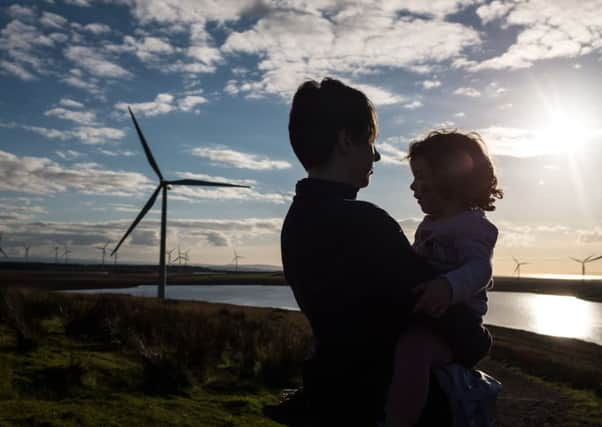Wind turbines '˜provided two thirds of Scots energy needs'


WWF Scotland described the WeatherEnergy data as “amazing progress” and urged politicians to maximise renewable opportunities.
Figures show that Scotland’s total electricity consumption from homes, business and industry in February was 1,984,765 MWh.
Advertisement
Hide AdAdvertisement
Hide AdWind turbines contributed 1,331,420 MWh of electricity to the National Grid over the same time, enough to supply the average needs of all Scottish homes and up 43 per cent on February 2016, when wind energy provided 929,417 MWh.
WWF Scotland director Lang Banks said: “Thanks to a combination of increased capacity and stronger winds, output from turbines was up more than two-fifths compared to the same period last year.
“This was enough power to provide the equivalent of the electrical needs of almost four million homes. As well as helping to power our homes and businesses, wind power supports thousands of jobs and helps Scotland to avoid over a million tonnes of polluting carbon emissions every month.
“Every one of the main political parties supports the aim of generating half of all Scotland’s energy needs from renewables by 2030 – including heat, electricity and transport. With this level of political backing, we call upon all of the parties to now bring forward policies that will help maximise the benefits to Scotland’s economy, as we transition to a renewable future.”
Karen Robinson, of WeatherEnergy, said: “Compared to last year, some very powerful winds across the month helped increase the total electricity supplied to the National Grid from Scotland’s wind turbines.
“As we began to witness for the first time last year, this February has also seen a few days where the power output from wind farms exceeded the total electricity demand for an entire day. This is quite an achievement.
“With the increasing occurrence of ‘100 per cent wind power days’ there can be little doubt that Scotland is well-placed to begin the next step of increasing the role that renewables could play in cutting carbon emissions from its transport and heating sectors.”
The Scottish Liberal Democrats said the data shows that Scotland can be a “world leader in developing and rolling out new technologies”.